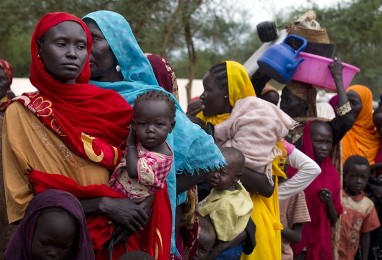Japanese envoy visits refugee camps in S. Sudan’s Upper Nile state
August 30, 2015 (JUBA) – The Japanese ambassador to South Sudan, Kiya Masahiko, concluded a visit to South Sudan’s Upper Nile state last week to show solidarity with the refugees and appreciate the impact of Japan’s aid contribution to their living conditions.

During the trip, the Japanese envoy reportedly visited some of the projects funded by the government of Japan in Doro camp, including classrooms at the Nur primary school, a solar-power borehole and the mud-plastered transitional shelters for vulnerable refugees.
Masahiko, UNHCR said, also visited Maban county hospital, which has been equipped with a X-ray room, two operating theatres, three paediatric wards and a pharmacy over the last two years, courtesy of funding from donors, including Japan.
“This hospital serves more than 200,000 people from the refugee and host communities and remains the only functioning hospital in the entirety of Upper Nile State since the start of the conflict in December 2013,” UNHCR said in a statement.
Japan, UNHCR’s second largest donor globally has reportedly contributed more than $16 million since 2014 to support UN refugee agency’s efforts to protect and assist refugees and extend a helping hand to host communities in the world’s youngest nation.
“Japan’s support has been key in improving the living conditions of tens of thousands of Sudanese refugees who have found shelter in camps in Upper Nile and Unity states as well as many South Sudanese living within and around Maban camps,” said Warsame.
“We were able to build better shelters for families and ensure higher standards in health, water, sanitation and education,” he added.
The Japanese envoy reportedly met the refugee leaders to hear the concerns of their community. Access to higher education, health care, food and shelters were said to be top priorities for the refugees as do Internet connectivity for education and access to labor-saving modern farm technologies like tractors to increase agricultural production.
“Resources are limited, but we are committed to continue our support for refugees and host communities in South Sudan,” said ambassador Masahiko.
“It is important that the contribution of the people of Japan reaches the most needy refugees and makes substantive improvements in their livelihoods,” he stressed.
Currently, South Sudan reportedly has some 265,000 refugees of which nearly 90% are from South Kordofan and Blue Niles states and live in Unity and Upper Nile state camps. The remaining 10% are refugees from the Democratic Republic of Congo, the Central African Republic and Ethiopia who live mostly in Central and Western Equatoria state.
(ST)
